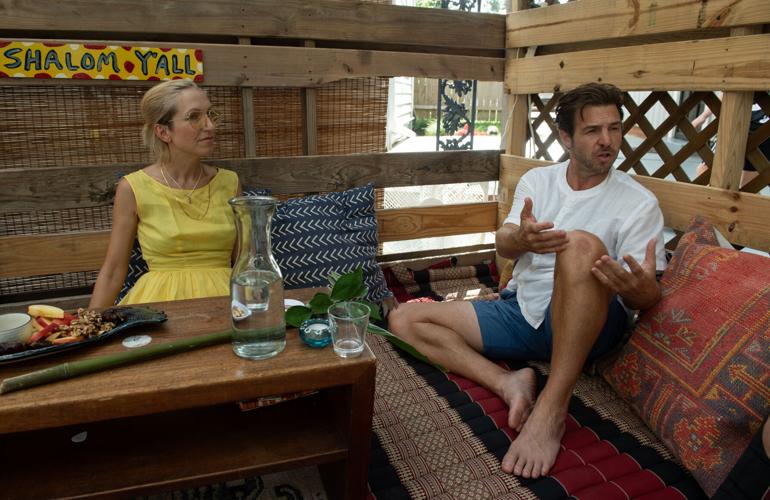Jews make up one of the smallest religious communities in Lafayette, but their history includes some of the most prominent businessmen and philanthropists since the city’s founding.
Today, the legacy of the Heymanns, Levys, Falks, Bendels and others has produced a business and civic environment that continues to attract professionals from across the world. When a Jewish family moves to town, they find a small but active community that supports one another and welcomes anyone wanting to learn more about Judaism.
Last week the Dolegowski/Naquin family invited guests to their home eager to participate in Sukkot, the Jewish holiday that celebrates the fall harvest season. It is commemorated through building an outdoor Sukkah, a three-walled, open-ceilinged structure where people gather to eat meals and remember times of hardship and plenty.
This year, Sukkot was observed Sept. 29-Oct. 6.
“We get really excited about celebrating all of the holidays, and we love when our non-Jewish friends and family come over,” says Jenee Naquin. Her husband, Ari Dolegowski, grew up in much larger Jewish communities in New York and Colorado but feels that Lafayette made him “more Jewish.”
“It’s different when everyone around you is a Jew, too,” he says. “Then it’s like ‘Eh, I don’t have to do all that.’ Here, it feels more special and important to express your faith and share it. And when we moved, I felt really good about how Lafayette has a synagogue.”
The couple moved to Lafayette in 2020 with their son, Noam, to be closer to Naquin’s family from Eunice. They met and began their relationship while living in New York City in their 20s, and as they grew closer, Naquin explored the idea of converting to Judaism — eventually making the leap when their family decided to move to Louisiana.
“When I met Ari and he started bringing me to Shabbat dinners, I came to really be enamored by all of it,” she says. “The traditions are so rich, much like Cajun traditions. And I loved how intertwined spirituality was in the culture.”
Another Lafayette resident, Zachary Stein, moved to Lafayette from the Chicago area in 2016 to work at the Edith Garland Dupré Library at the University of Louisiana at Lafayette. He also found a close-knit community that eased his transition to life in south Louisiana.
“Where I’m from, we had a pretty large Jewish community,” says Stein. “But here we’re very much connected. We reach out and help each other. Before I moved here, I was looking for a place to live, and the first place I called was Temple Shalom. The Temple president picked up and gave me advice about the area and a lot of interesting facts.”
The Jewish community formally organized in Vermilionville thanks to a Gov. Alexander Mouton land grant, which allowed them to construct a cemetery in 1869 and a temple in 1881, both on what is now Lee Avenue.
Early prominent citizens included Lazarus Levy, a Russian-born Jew who moved to Vermilionville in 1878 and operated successful dry goods stores with his sons. In 1980 his granddaughter, Flora Levy, endowed UL-Lafayette’s ongoing Flora Levy Humanities Series, which brings internationally acclaimed speakers to the university each year.
Another giant of Lafayette Jewish history was Benjamin Falk, a high-profile businessman who owned Falk Opera House and helped to establish the Lafayette Improvement Organization in the late 19th century — an early forerunner to the One Acadiana economic development organization.
The efforts of these men in developing Lafayette set the stage for Maurice Heymann, who left a legacy that goes well beyond the opening of the Heymann Oil Center in 1952.
His contributions to the city touched nearly every aspect of life in Lafayette’s mid-century boom period — from opening his early retail businesses on Jefferson Street that would become the area’s first department store and supermarket to later selling Oil Center property for the development of a hospital that evolved into the region’s largest full-service medical center.
Heymann was also a major philanthropist and supporter of religious, educational and civic organizations across Lafayette — including donating money for the construction of the new Trinity CME church on Lee Avenue in 1954, still home to the city’s oldest Black congregation. Some even credit the businessman with being the “father of Lafayette Mardi Gras,” thanks to his being among the founding members and a primary supporter of the Greater Southwest Louisiana Mardi Gras Association.
“We called him Papa,” says Joan Heymann-Bergmann, one of Heymann’s granddaughters. “He had a special relationship with Lafayette, and the Christian community really supported him. He referred to it as the New South where he felt anti-Semitism wasn’t as prominent at the time.”
“Papa talked about how important it was to give back to the community that had been so great to him. He gave away clothes from his store and helped out a lot with the orphanages at the time. He instilled that in my father (Herbert Heymann, founder of the Heymann Foundation) who was an amazing, generous man.”
Today, Jews represent less than 1% of the population across Louisiana, according to data from the Pew Research Center. The Goldring/Woldenberg Institute of Southern Jewish Life estimates that while Lafayette’s Jewish population boomed to around 600 residents in the 1980s, largely thanks to jobs in the Oil Center, today that number may be less than 200.
“You have to be active. It takes everyone to help run this place,” says Temple Shalom President Vivian Katz, speaking of how Temple Shalom thrives even as the generations change.
“We’re a bit of a different Temple community now, because many of the older families have died out. But we have people coming in from Crowley and Opelousas, and a lot of the congregants now are in inter-marriages where one of the partners is not Jewish. Anyone and everyone is welcome here.”







